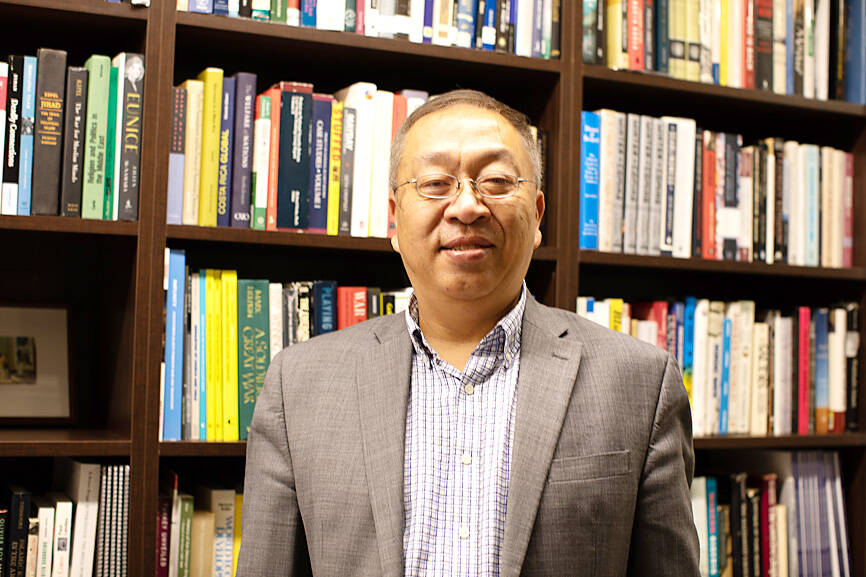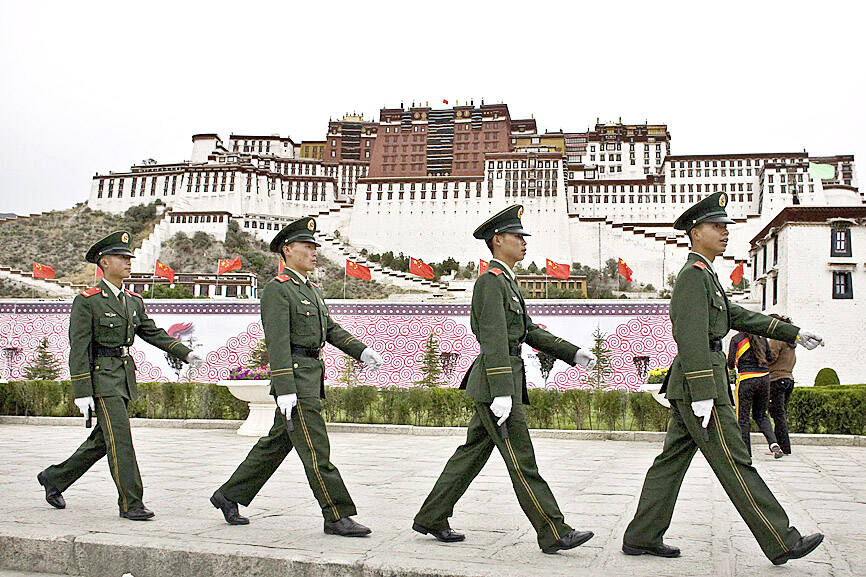China has sanctioned two US citizens in retaliation for action taken by Washington over human rights abuses in Tibet, the Chinese government said yesterday, amid a continuing standoff between the sides over Beijing’s treatment of religious and ethnic minorities.
The Chinese Ministry of Foreign Affairs said in a statement that Hudson Institute senior fellow Miles Yu (余茂春), a Taipei Times contributor, and US Congressional-Executive Commission on China Deputy Staff Director Todd Stein, along with their close family members, would be banned from entering China.
Any assets they had in China would be frozen and they would be barred from contact with people or organizations within China, it said.

Photo: CNA
The notice said the measures were in response to the US sanctioning two Chinese citizens “under the excuse of the ‘Tibet human rights’ issue.”
Chinese foreign ministry spokesperson Mao Ning (毛寧) said China was responding to what it considered a contravention of the “basic norms of international relations,” and that Stein and Yu “behaved egregiously on Tibet and other China-related issues.”
“We would like to stress once again that Tibetan affairs are purely an internal affair of China, and the US has no right to interfere in it, and that gross interference in China’s internal affairs will be met with strong countermeasures from China,” Mao told reporters at a daily briefing.

Photo: REUTERS
“We urge the US to withdraw the so-called sanctions and stop interfering in Tibetan affairs and China’s internal affairs,” she said.
Neither Stein nor Yu could be reached for comment by press time last night, although Yu posted on Twitter: “A badge of honor to be sanctioned once again today by the Beijing government, the enemy of the Chinese people. Let freedom ring!”
On Dec. 9, the US imposed sanctions on Wu Yingjie (吳英杰), the Chinese Communist Party secretary of the Tibet Autonomous Region from 2016 to last year, and Zhang Hongbo (張洪波), China’s police chief in the Himalayan region since 2018.
“Our actions further aim to disrupt and deter the People’s Republic of China’s (PRC) arbitrary detention and physical abuse of members of religious minority groups in the Tibetan Autonomous Region,” US Secretary of State Antony Blinken said when announcing the sanctions.
An accompanying notice by the US Department of the Treasury said Wu had been responsible for “stability policies” in Tibet, whose implementation involved “serious human rights abuse, including extrajudicial killings, physical abuse, arbitrary arrests, and mass detentions.”
It said that during Zhang’s tenure, police have been engaged in serious human rights abuses, including “torture, physical abuse and killings of prisoners, which included those arrested on religious and political grounds.”
The Chinese announcement gave no specific accusations against Stein and Yu.
Stein has been deputy staff director at the US agency since last year and previously served as senior adviser to US Undersecretary of State for Civilian Security, Democracy and Human Rights Sarah Sewall, including serving as her lead staffer on Tibetan issues. Previously, he was director of government relations at the monitoring group International Campaign for Tibet.
Yu is a senior academic who taught at the US Naval Academy and a noted critic of Chinese President Xi Jinping (習近平). He served as key China adviser to former US secretary of state Mike Pompeo.
China has in the past few years passed legislation mandating tit-for-tat sanctions against foreign individuals from the US, the EU and other countries over perceived slights against its national interests. Washington and others have compiled a long list of Chinese officials barred from visiting or engaging in transactions with their financial institutions ranging from the Hong Kong chief executive to local officials accused of human rights abuses.
China claims Tibet has been part of its territory for centuries, although backers of the Dalai Lama, the exiled Buddhist leader of the region, say it was functionally independent for most of that time.
Communist forces invaded in 1950 and China has ruled the Himalayan region with an iron fist ever since, imposing ever stricter surveillance and travel restrictions since the last uprising against Beijing’s rule in 2008. Lengthy prison sentences in dire conditions are imposed for acts of defiance, including defending the region’s unique language and Buddhist culture from attempts at assimilation.
China has also been accused of detaining hundreds of thousands of Uighurs and other Muslim minorities in re-education camps as part of a campaign to wipe out their native language and culture, including through forced adoptions and sterilizations.
China denies such charges, saying it has only been fighting terrorism, separatism and religious extremism.

SECURITY: As China is ‘reshaping’ Hong Kong’s population, Taiwan must raise the eligibility threshold for applications from Hong Kongers, Chiu Chui-cheng said When Hong Kong and Macau citizens apply for residency in Taiwan, it would be under a new category that includes a “national security observation period,” Mainland Affairs Council (MAC) Minister Chiu Chui-cheng (邱垂正) said yesterday. President William Lai (賴清德) on March 13 announced 17 strategies to counter China’s aggression toward Taiwan, including incorporating national security considerations into the review process for residency applications from Hong Kong and Macau citizens. The situation in Hong Kong is constantly changing, Chiu said to media yesterday on the sidelines of the Taipei Technology Run hosted by the Taipei Neihu Technology Park Development Association. With

CARROT AND STICK: While unrelenting in its military threats, China attracted nearly 40,000 Taiwanese to over 400 business events last year Nearly 40,000 Taiwanese last year joined industry events in China, such as conferences and trade fairs, supported by the Chinese government, a study showed yesterday, as Beijing ramps up a charm offensive toward Taipei alongside military pressure. China has long taken a carrot-and-stick approach to Taiwan, threatening it with the prospect of military action while reaching out to those it believes are amenable to Beijing’s point of view. Taiwanese security officials are wary of what they see as Beijing’s influence campaigns to sway public opinion after Taipei and Beijing gradually resumed travel links halted by the COVID-19 pandemic, but the scale of

TRADE: A mandatory declaration of origin for manufactured goods bound for the US is to take effect on May 7 to block China from exploiting Taiwan’s trade channels All products manufactured in Taiwan and exported to the US must include a signed declaration of origin starting on May 7, the Bureau of Foreign Trade announced yesterday. US President Donald Trump on April 2 imposed a 32 percent tariff on imports from Taiwan, but one week later announced a 90-day pause on its implementation. However, a universal 10 percent tariff was immediately applied to most imports from around the world. On April 12, the Trump administration further exempted computers, smartphones and semiconductors from the new tariffs. In response, President William Lai’s (賴清德) administration has introduced a series of countermeasures to support affected

Pope Francis is be laid to rest on Saturday after lying in state for three days in St Peter’s Basilica, where the faithful are expected to flock to pay their respects to history’s first Latin American pontiff. The cardinals met yesterday in the Vatican’s synod hall to chart the next steps before a conclave begins to choose Francis’ successor, as condolences poured in from around the world. According to current norms, the conclave must begin between May 5 and 10. The cardinals set the funeral for Saturday at 10am in St Peter’s Square, to be celebrated by the dean of the College